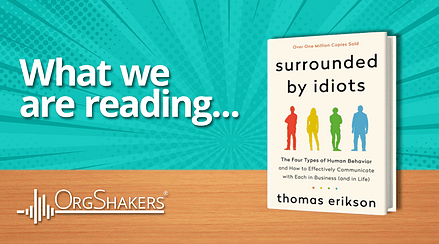Menu

Fundamental Shifts in HR: Part 4, The End of Jobs
After discussing the world of HR consulting with Sarah Hamilton-Gill on her podcast, Leap Into HR Consulting, we moved onto looking at the four fundamental shifts that I predict we will be seeing in the near future that HR professionals need to be preparing themselves for.
We discussed the looming edge of the Workforce Cliff, the importance that employers need to be applying to the relationship between humans and technology, and the redefinition of Place and Time in the workplace. The final shift I believe businesses and HR professionals need to be preparing for is the end of jobs altogether.
The ‘job’ – defined as a set of responsibilities assigned to an individual employee – has been the fundamental building block of organizations for millennia. As the requirements of businesses have changed over the years, employers have tweaked and amended the job descriptions of their employees to adapt to these changes.
However, we have seen that the pace of this organizational change has been rapidly accelerated by the influx of new technologies paired with the evaporation of the boundaries of time and geography. Now, employers are beginning to recognize that a more flexible and responsive methodology is needed in order to keep up with this new pace of change, and so I believe we are going to see companies increasingly adopting a skills-based approach to managing work and workers. Deloitte’s 2023 Global Human Capital Trends report supports this notion, as it was discovered that 93% employers believe that moving away from the job construct is important or very important to their organization’s success.
And yet, the research also identified a readiness gap, as only 20% of these employers felt they were very ready to address the movement away from the ‘job’.
This is where HR will play a vital role, as they will be the key to bridging this gap and educating organizations around this new approach to work. And a large part of this will be challenging legacy mindsets and traditional practices that are holding employers back from skills-based work – which Deloitte reported was the main obstacle for 46% of companies.
HR will therefore have to pioneer a shift in the traditional mindset of allocating work to individuals in defined jobs to one where the work is deconstructed and assigned by:
- Making the starting point for resource allocation the actual work that needs to be done, broken down into the individual tasks which need to be completed to achieve the required outcomes.
- Identifying the optimal combination of human skill, AI, and technology/automation to achieve the required outcomes.
- Identifying the optimal contractual engagement model for work that requires human skill, e.g.: employment, freelance, alliances, etc.
- Allowing human skill to ‘flow’ to the work instead of being constrained by traditional fixed hierarchies and organizational structures.
Rather than viewing workers as ‘job holders’ performing predefined tasks, it is important to recognize them as individuals with unique skill sets. This will enable employers to match each worker with tasks that align with their specific skills. This work can be performed by a single person, a team, or a group of rotating resources, each contributing their appropriate skills while improving their current ones and developing new ones. This approach will enable workers to maximize their potential and contribute to their personal growth. It will also create a more equitable and human-centric work experience.
If you would like to discuss how OrgShakers can help guide and support you on this journey, please get in touch with me at david@orgshakers.com or reach out through our website here.

David Fairhurst is the Founder of OrgShakers. He is widely considered to be one of the world’s leading HR practitioners and is a respected thought leader, business communicator, and government advisor.



